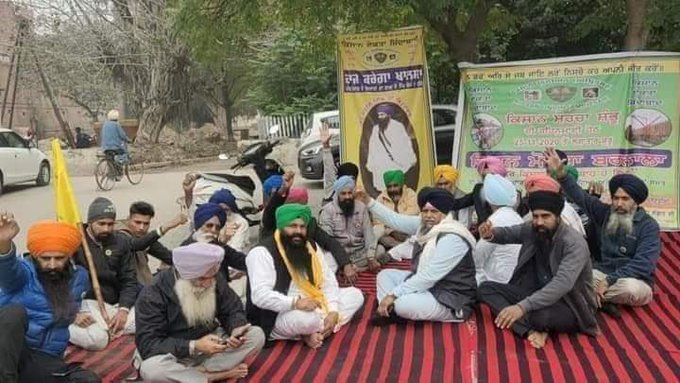Union Ministers Narendra Singh Tomar and Piyush Goyal on Thursday urged the farmers camping at the border of Delhi in protests against the three revolutionary farm laws to reconsider the government’s rather large-hearted proposals, which have been provided in written this time. This came after the farmer unions, led by duplicitous Congress-fronts like the Bharatiya Kisan Union outrightly rejected the written proposals and assurances forwarded by the Centre. The farm unions also unilaterally, and in the contestation of basic decency, announced that they would be intensifying their agitation and blocking national highways and rail tracks until their demands for the complete repeal of the three farm laws are met.
It is no secret that Khalistani elements have hijacked the ongoing farmers’ protests and that a variety of opposition parties are scoring brownie points with the ongoing agitation. Effectively, what vested interest groups and opposition parties are doing is driving a wedge between the farmers of Punjab and Haryana, and the rest of India. It must be remembered that unlike In Punjab and Haryana, 86 per cent of the total farm population in the country is comprised of small and marginal growers, who have been hoping for years on end that the agriculture sector of India be liberalised, and that they are freed from the shackles of inhibitive schemes which happen to benefit the rich zamindars of two north Indian states alone.
Of course, opposition parties from all Indian states can send in a few farmers to “represent” their state, and make the largely Punjab-Haryana-centric agitation look like a nationwide movement, which is a blatant lie. The farmers across the country are thanking their fortunes that a government has finally shown the courage to bring in much-awaited reforms, liberalising the nation’s agricultural sector. The opposition and vested interest groups are too myopic to see through such realities, and for the Khalistanis, such realties will never matter.
What is happening, therefore, is that farmers from across the country are silently watching the circus play out at the borders of the national capital. Now, here we would like to present a largely improbable, yet not an entirely impossible scenario. If for some reasons, the Centre budges and agrees to repeal the three farm laws to bring in the same reforms after further deliberations, the farmers across India would feel disheartened, or even worse, dejected. Upon the largely unlikely repeal of the three farm laws, there is no reason to believe that farmers across the country would not take to the streets and launch a much bigger agitation against the repeal of the present reforms.
Now, if the Centre chalks out a plan to bring in a fresh set of laws after their repeal in the present form, there is nobody who can say with certainty that all sides would be satisfied. Any fresh laws will come after discussions with farmers from across the country, and there too, the demands of the farmers from Punjab and Haryana will largely differ from those who toil in fields across the country, since the realities between the two sides are poles apart. If the current agitation is anything to go by, the farmers’ unions are unwilling to find a middle ground with the Centre. This stalemate would therefore continue till eternity, virtually making the reforms stuck in the pipeline all over again.
Already, the BJP’s performance in the Panchayat election of Rajasthan has shown how the rural community of India, largely comprising of farmers, has voted in favour of the Modi government subsequent to the controversy surrounding the three farm laws. It is now upon the Central government to brave the current storm, and not to repeal the laws under any circumstances. Needless to say, the current agitation will also wear out with time. However, a repeal of the laws would signal to vested interest groups in the country and opposition parties too that the government can be strong-armed into submission on any given issue. That must definitely not be the message which is sent out across the world.
